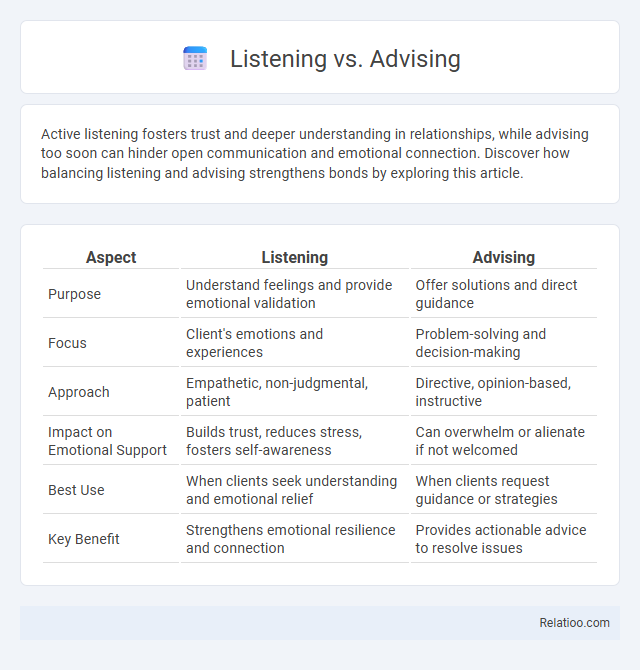Active listening fosters trust and deeper understanding in relationships, while advising too soon can hinder open communication and emotional connection. Discover how balancing listening and advising strengthens bonds by exploring this article.
Table of Comparison
| Aspect | Listening | Advising |
|---|---|---|
| Purpose | Understand feelings and provide emotional validation | Offer solutions and direct guidance |
| Focus | Client's emotions and experiences | Problem-solving and decision-making |
| Approach | Empathetic, non-judgmental, patient | Directive, opinion-based, instructive |
| Impact on Emotional Support | Builds trust, reduces stress, fosters self-awareness | Can overwhelm or alienate if not welcomed |
| Best Use | When clients seek understanding and emotional relief | When clients request guidance or strategies |
| Key Benefit | Strengthens emotional resilience and connection | Provides actionable advice to resolve issues |
Understanding the Difference: Listening vs Advising
Listening involves fully concentrating on the speaker's message to comprehend their feelings and thoughts, whereas advising focuses on offering solutions or recommendations based on the information provided. Effective listening prioritizes empathy and validation without interrupting, while advising shifts the dynamic towards problem-solving and guidance. Understanding this distinction enhances communication by ensuring the speaker feels heard before any advice is given.
The Power of Active Listening
Active listening enhances communication by fully concentrating on Your speaker, understanding their message, and responding thoughtfully. Unlike advising, which offers solutions, or supportiveness that provides emotional comfort, active listening fosters trust and clarity by validating the speaker's feelings and perspectives. This powerful skill leads to stronger relationships, reduces misunderstandings, and encourages open dialogue in personal and professional settings.
When is Advising Appropriate?
Advising is appropriate when the individual explicitly seeks guidance or expertise, particularly in situations requiring specialized knowledge or decision-making support. It is most effective when the advisor understands the context and the needs of the person, ensuring that suggestions are relevant and actionable. Advising should be balanced with active listening and supportiveness to foster trust and encourage open communication.
Benefits of Being a Good Listener
Being a good listener enhances communication by fostering trust and understanding, which leads to stronger relationships and reduced conflicts. Active listening allows individuals to accurately grasp others' needs and concerns, promoting empathy and effective problem-solving. This skill improves collaboration and emotional support, benefiting both personal and professional environments.
Common Pitfalls of Giving Advice
Common pitfalls of giving advice include interrupting your listener, assuming you know their situation better, and offering unsolicited solutions that may feel dismissive. Over-advising can diminish supportiveness, as your focus shifts from truly listening and understanding to fixing the problem. Your support is most effective when you prioritize empathic listening, allowing others to share their thoughts before gently offering guidance.
Emotional Impact: Listening vs Advising
Listening creates a safe emotional space that validates feelings and fosters trust, while advising often shifts focus to problem-solving, which can inadvertently minimize emotional expression. Emotional impact is stronger in listening because it encourages empathy and understanding, leading to deeper emotional connection. Advising may be perceived as directive or dismissive when emotional needs are prioritized over solutions.
How to Balance Listening and Advising Skills
Balancing listening and advising skills requires active engagement with the speaker's message while offering guidance that respects their perspective. Effective communication hinges on empathetic listening to fully understand concerns before providing tailored advice that empowers decision-making. Prioritizing supportiveness fosters trust, enabling a dynamic interplay between attentive listening and thoughtful advising.
Situations that Require Just Listening
Situations that require just listening often involve emotional distress, personal challenges, or moments of vulnerability where individuals need empathy rather than solutions. Listening creates a safe space for people to express feelings without judgment, fostering trust and validation. In these contexts, offering advice prematurely can hinder emotional processing and weaken supportiveness.
Building Trust through Effective Listening
Effective listening significantly enhances trust by demonstrating genuine attention and empathy, which strengthens interpersonal connections. Unlike advising, which may impose solutions, and general supportiveness, which offers emotional backing, active listening prioritizes understanding the speaker's perspective. Building trust through active listening fosters open communication, reduces misunderstandings, and creates a foundation for collaborative problem-solving.
Enhancing Communication: Best Practices
Effective communication hinges on balancing listening, advising, and supportiveness to truly understand and address your counterpart's needs. Active listening involves fully concentrating, understanding, and responding thoughtfully, while advising adds value by offering relevant insights without dominating the conversation. Demonstrating supportiveness fosters trust and openness, ensuring that your advice is both received and acted upon, thereby enhancing overall communication outcomes.

Infographic: Listening vs Advising
 relatioo.com
relatioo.com